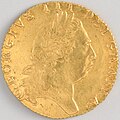Lewis Pingo
Lewis Pingo (1743 - 26 August 1830), was a noted eighteenth medallist and engraver.[1] From a family of engravers and medallists, he was the son of the Assistant Engraver at the Mint, Thomas Pingo. He was also the brother of the engraver, John Pingo and the York Herald, Benjamin Pingo.[2]
Career[edit]
In 1776 he was appointed to succeed his father as assistant-engraver at the mint where he served until 1779 when he was appointed chief engraver.[1] Pingo engraved the dies for the shillings and sixpences of George III in the issue of 1787 and the second variety of the Maundy money of George III.[3][4] He also engraved dies for the three-shilling Bank token and for the East India Company's copper coinage.[5] He made patterns for the guinea, seven-shilling piece, penny and halfpenny of George III.[6][7] Among Pingo's medals may be noticed: medal of Dr. Richard Mead, struck in 1773; the Royal Society Copley medal, with bust of Captain J. Cook, 1776; Freemasons' Hall medal, 1780; ‘Defence of Gibraltar,’ 1782; Christ's Hospital medal, reverse, open bible; medal of William Penn.[8][9][10] His medals are signed L. P. and L. PINGO.[1]
Personal life[edit]
Lewis Pingo was born in the year 1743 in London.[11] He married twice and had eight daughters.[2] One of his wives was Sarah Rowley, daughter of Vice-Admiral Sir Joshua Rowley, 1st Baronet, one of their daughters, Sarah Pingo married John Horton of Sheriffhales Manor, Shifnal and was the grandmother of Mary Julia Horton who married John Moore Lester.[2][12]
Pingo died at Camberwell on 26 August 1830.[1]
Gallery[edit]
-
1783 Royal Society of London Medal
-
George III Guinea
-
George III Guinea
-
Military George III Guinea
-
Military George III Guinea
References[edit]
This article incorporates text from a publication now in the public domain: Wroth, Warwick William (1896). . In Lee, Sidney (ed.). Dictionary of National Biography. Vol. 45. London: Smith, Elder & Co. pp. 314–315.
- ^ a b c d W. W. Wroth (1895). "LEWIS PINGO". Oxford Dictionary of National Biography. Oxford University Press. doi:10.1093/odnb/9780192683120.013.22297. Retrieved 1 April 2023.
- ^ a b c W. W. Wroth (1895). "PINGO FAMILY". Oxford Dictionary of National Biography (online ed.). Oxford University Press. doi:10.1093/ref:odnb/63939. Retrieved 1 April 2023. (Subscription or UK public library membership required.)
- ^ Hawkins, Edward (1841). The Silver Coins of England. London: E. Lumley. p. 411.
- ^ Hawkins, Edward (1841). The Silver Coins of England. London: E. Lumley. p. 416.
- ^ Urban, Sylvanus (1818). "The Gentleman's Magazine and Historical Chronicle". 88 (1): 180.
{{cite journal}}: Cite journal requires|journal=(help) - ^ Crowther, Geoffrey (1887). A Guide to English Pattern Coins in Gold, Silver, Copper, and Pewter: From Edward I. to Victoria, With Their Value. London: L.U. Gill. p. 36.
- ^ Montagu, Hyman (1885). The Copper, Tin and Bronze Coinage and Patterns for Coins of England. London: Rollin & Feuardent. p. 105.
- ^ Hawkins, Edward (1841). The Silver Coins of England. London: E. Lumley. p. 675.
- ^ Cochran- Patrick, Robert (1884). Catalogue of the medals of Scotland. London. p. 108.
{{cite book}}: CS1 maint: location missing publisher (link) - ^ Hawkins, Edward (1841). The Silver Coins of England. London: E. Lumley. p. 348.
- ^ "Lewis Pingo 1743 - 1830". Collection. The Science Museum Group. Retrieved 20 September 2023.
- ^ Cokayne, George Edward (1900). The Complete Baronetage, 5 volumes. Gloucester. p. 253.
{{cite book}}: CS1 maint: location missing publisher (link)





